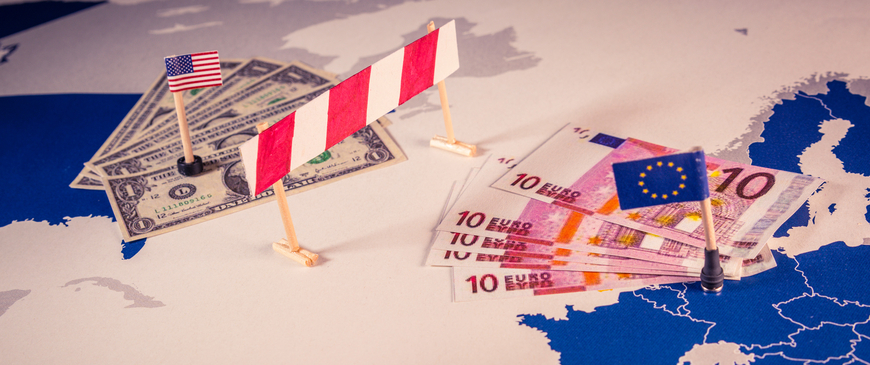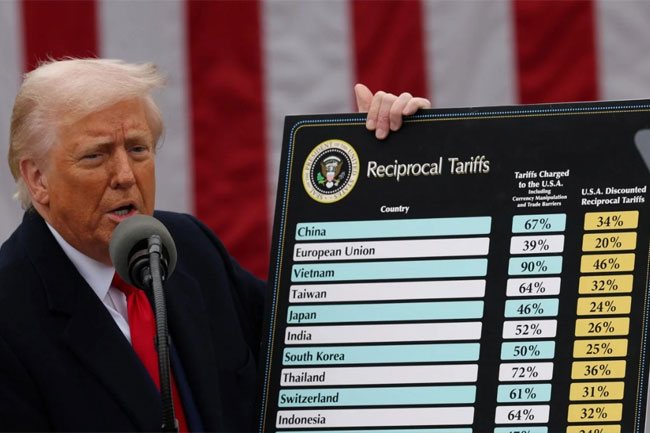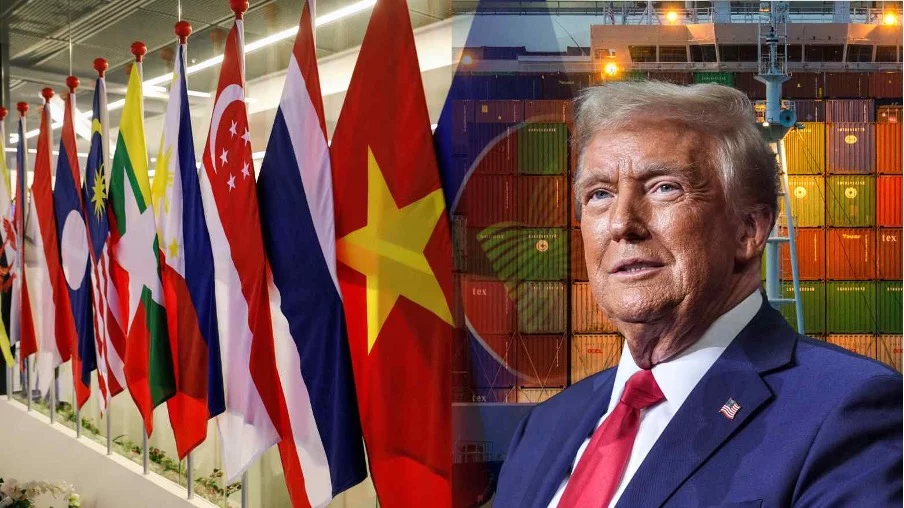Trump’s “Liberation Day” Tariffs: Full List by Country & Key Sectors
Here’s the full list of 180+ countries affected by Trump’s reciprocal tariffs, organised by region, with key sectors impacted and tariff rates. The data is synthesised from multiple sources, including the White House announcement and detailed reports from Newsweek, CNBC, and The Boston Globe
1. Asia-Pacific
| Country | New U.S. Tariff | Key Sectors Impacted |
|---|---|---|
| China | 34% (54% cumulative) | Electronics, textiles, machinery, semiconductors |
| Vietnam | 46% | Footwear, furniture, electronics |
| Taiwan | 32% | Semiconductor chips, tech components |
| Japan | 24% | Autos, machinery, electronics |
| South Korea | 25% | Cars, smartphones, displays |
| India | 26% | Pharmaceuticals, IT services, textiles |
| Thailand | 36% | Rubber, electronics, auto parts |
| Indonesia | 32% | Palm oil, coal, textiles |
| Malaysia | 24% | Electronics, palm oil |
| Philippines | 17% | Electronics, agriculture |
| Cambodia | 49% | Textiles, footwear |
| Bangladesh | 37% | Garments, textiles |
| Singapore | 10% | Pharmaceuticals, petrochemicals, electronics |
| Australia | 10% | Mining, agriculture |
| New Zealand | 10% | Dairy, agriculture |
Regional Impact:
-
Tech & Semiconductors: Disruptions in Taiwan (32%) and South Korea (25%) threaten global chip supplies
-
Textiles & Apparel: Bangladesh (37%), Cambodia (49%), and Vietnam (46%) face steep tariffs, potentially shifting production to lower-tariff ASEAN nations

2. Europe
| Country | New U.S. Tariff | Key Sectors Impacted |
|---|---|---|
| European Union | 20% (bloc-wide) | Cars (Germany), wine (France), luxury goods |
| UK | 10% | Financial services, autos |
| Switzerland | 31% | Pharmaceuticals, luxury watches |
| Norway | 15% | Oil, seafood |
| Turkey | 10% | Textiles, automotive |
Regional Impact:
-
Auto Industry: German automakers (e.g., BMW, Volkswagen) face 20% tariffs, potentially raising prices for U.S. consumers
-
Luxury Goods: Swiss watches (31%) and French wines (20%) could see reduced U.S. demand

3. Americas
| Country | New U.S. Tariff | Key Sectors Impacted |
|---|---|---|
| Canada | Exempt (existing 25%) | Energy, autos |
| Mexico | Exempt (existing 25%) | Autos, agriculture |
| Brazil | 10% | Agriculture, minerals |
| Argentina | 10% | Beef, soybeans |
| Chile | 10% | Copper, wine |
Regional Impact:
-
Auto Supply Chains: Mexico and Canada retain existing tariffs, but U.S. automakers may face higher costs for parts
-
Agriculture: Brazil (10%) and Argentina (10%) could lose competitiveness in soy and beef exports
4. Middle East & Africa
| Country | New U.S. Tariff | Key Sectors Impacted |
|---|---|---|
| Saudi Arabia | 10% | Oil, petrochemicals |
| Israel | 17% | Tech, diamonds |
| South Africa | 30% | Mining, agriculture |
| Nigeria | 14% | Oil, cocoa |
| Egypt | 10% | Textiles, natural gas |
Regional Impact:
-
Oil Markets: Saudi Arabia (10%) and Nigeria (14%) tariffs may marginally affect crude prices
-
Mining: South Africa (30%) faces higher costs for platinum and gold exports

5. Other Notable Tariffs
| Country | New U.S. Tariff | Key Sectors Impacted |
|---|---|---|
| Sri Lanka | 44% | Textiles, tea |
| Pakistan | 29% | Textiles, rice |
| Madagascar | 47% | Textiles, vanilla |
| Lesotho | 50% | Textiles (highest global rate) |
Sectoral Focus:
-
Textiles: Sri Lanka (44%), Pakistan (29%), and Lesotho (50%) face severe disruptions
-
Pharmaceuticals: India’s 26% tariff risks drug shortages in the U.S.
Key Takeaways for Singapore
-
Baseline 10% tariff applies to exports like electronics and petrochemicals
-
Opportunity: Vietnam’s 46% pain may drive manufacturing relocations to Singapore
-
Risk: China’s 54% cumulative tariff could weaken demand for Singaporean goods
“This is how you start a global depression,” — Peter Baum, CFO of Baum Essex, after relocating factories from China to Vietnam only to face 46% tariffs
Will ASEAN’s high-tariff nations (Vietnam, Cambodia) pivot supply chains to Singapore?
It’s important to note that tariff policies can evolve rapidly, and final rates may depend on negotiations or exemptions granted after initial announcements. For real-time updates, readers should consult official government statements or trusted news outlets.
Let us know what you think about this topic, and what do you want to hear next.
You can now be our community contributor and make a pitch to have your favourite personality be on our show.
Join our community group and drop us your insights on this topic.

-3.png?width=50&name=Square%20(2)-3.png)







Let us know what you think of this post